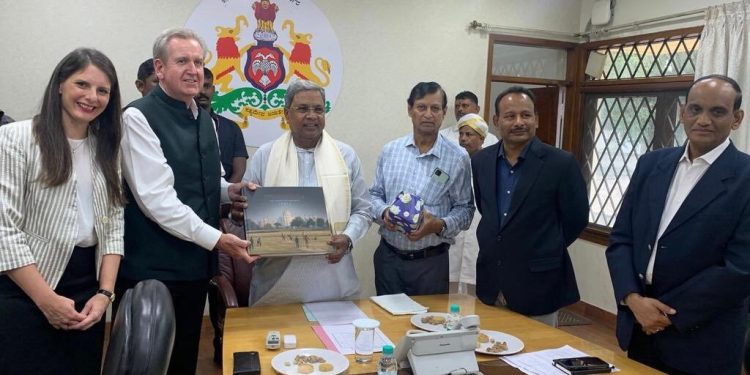In a significant development, Barry O’Farrell, the Australian Consul General in India, paid a visit to Karnataka Chief Minister Siddaramaiah in Bengaluru on Thursday. During their meeting, the two officials reached a decision to establish an Australian Consulate in the city.
The primary focus of the meeting was to enhance the bilateral relationship between Karnataka and Australia, particularly in sectors such as information technology and education. The Chief Minister’s Office issued a statement highlighting this objective.
Expressing his satisfaction, the Chief Minister conveyed his delight at the forthcoming opening of the Australian Consulate in Bengaluru within a few days. He emphasised the state’s eagerness to collaborate with Australia across diverse domains, citing Karnataka’s impressive advancements in technology and education.
On Thursday, Barry O’Farrell, the Australian High Commissioner to India, held a meeting with Karnataka Chief Minister Siddaramaiah in Bengaluru. The primary topic of discussion revolved around the forthcoming opening of Australia’s Consulate-General in Bengaluru, which is expected to foster closer collaboration between the two nations in critical sectors such as education, innovation, space, and rural development.
O’Farrell took to Twitter to share the details of the meeting, expressing his congratulations to Chief Minister Siddaramaiah on his recent electoral victory. He emphasised how the soon-to-be-opened Consulate-General in Bengaluru, known as “Namma Bengaluru,” will serve as a platform for enhanced cooperation in crucial areas like education, innovation, space exploration, and rural development.
Australia’s Prime Minister, Anthony Albanese, recently announced the establishment of the new Australian Consulate General in Bengaluru, affirming that it would facilitate stronger connections between Australian businesses and India’s thriving digital and innovation ecosystem.
During a joint press conference held in Sydney, Australia, Prime Minister Albanese made an important announcement regarding the establishment of a new Australian Consulate General in Bengaluru, as per reports.
The objective behind this initiative is to facilitate stronger connections between Australian businesses and India’s flourishing digital and innovation ecosystem. Additionally, Prime Minister Albanese expressed his appreciation for India’s plans to establish a consulate general in Brisbane.
Highlighting the significance of this development, Prime Minister Albanese noted that the upcoming consulate in Bengaluru would be the fifth diplomatic presence in India representing Australia. He extended his gratitude to Prime Minister Modi for his visit to Australia, which was met with a warm reception. Furthermore, Prime Minister Albanese revealed his anticipation of returning to India in September for the G20 leaders summit.
Following the exchange of Memorandums of Understanding (MoUs) pertaining to mobility, migration, and a green hydrogen task force, both Prime Minister Modi and the Australian Prime Minister addressed the press conference, underscoring the outcomes of their discussions in Australia.
During his remarks, the Australian Prime Minister highlighted his frequent engagements with Prime Minister Modi over the course of a year. The ANI reported that he emphasised that the recent meeting held in Australia marked their sixth interaction within this timeframe. The Australian Prime Minister also made reference to the Quad Summit, which took place in Hiroshima, Japan, on the sidelines of the Group of Seven (G7) Summit.
Reiterating the statement issued during the Quad Summit, the Australian Prime Minister underlined the united stance of Quad leaders in favour of an open, stable, secure, and prosperous Indo-Pacific region.
He stressed the importance of respecting sovereignty and ensuring that all countries, regardless of their size, benefit from a regional balance that contributes to peace. The Australian Prime Minister’s mention of the number of meetings with Prime Minister Modi serves to highlight the close and ongoing dialogue between the two leaders.











